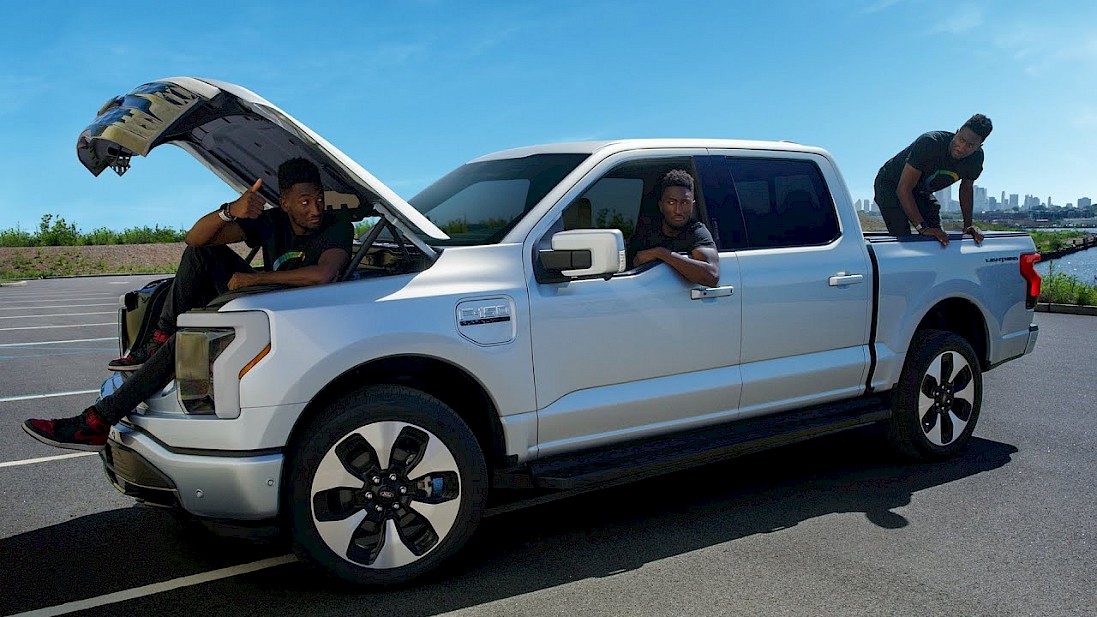The Ford all-electric F-150 is set to transform American car culture

Progress happens slowly, then suddenly. You see a guy on the street ostentatiously conducting a telephone call with a cellular phone the size of a brick pressed to his ear. Not much later, phones are palm-size and everywhere. Then your phone is a computer and camera and stereo and atlas and game console — so on and so forth rolled into one — and you cannot imagine life without it.
Thus it is with electric vehicles. In 1997, the first commercially successful hybrid, the Toyota Prius, entered the market in Japan. It solved the pesky problem of battery life by adding a small gasoline booster engine and an ingenious self-charging system that harnessed the energy of braking the car.
Engineers Martin Eberhard and Marc Tarpenning conceived of an all-electric luxury sedan and persuaded a team of investors led by Elon Musk to bankroll a start-up they called Tesla Motors in 2003. With the help of generous federal subsidies, their sleek machines became a status symbol in the United States and China.
But the breakthrough moment — the event that turns gradual change into a seismic shift — might only now be at hand. Ford Motor Co., one of the oldest names in the transportation business, is coming out with an all-electric pickup truck. After nibbling at the edges of America’s car culture, the electric revolution is going after the main course.
It’s difficult to overstate the importance of Ford’s F-series trucks, most notably the F-150. Despite a hiccup in manufacturing last year caused by a pandemic-related shortage in microchips, the trucks finished 2021 as the best-selling vehicles in the United States for the 45th year in a row. It’s a streak that’s older than “Star Wars.”
The nation’s passion for pickup trucks doesn’t stop there. The second-best seller in 2021 was the Ram pickup, and third-best was the Chevy Silverado. Americans need pickup trucks for work, they want pickup trucks for play, and they love pickup trucks enough to define themselves based on their preferred brand. On the flat, straight highways of middle America, you’ll often see a Chevy go by with a sticker in the window portraying a cartoon scamp tinkling on a Ford logo — or vice versa. Talk about brand loyalty.
Ford has been working its way toward this moment for years. Indeed, the company can make a reasonable case for itself as the inventor — certainly the popularizer — of the pickup. Company founder Henry Ford’s world-changing Model T, introduced in 1908 and beloved for nearly two decades, was offered in a number of configurations, including one with the back seat removed from the chassis and replaced with a box for hauling stuff. The purpose-built Ford pickup arrived in 1917, and the F-series made its debut in 1948. The superstar F-150 hit the market in 1975 and sprinted to the head of the pack in sales.
As a first step toward an electric truck, Ford switched from steel to aluminum for the bodies of the F-series in 2015, shaving hundreds of pounds from the vehicles’ weight — but opening the company to derision from competitors. One rival filmed a TV ad in which an F-150 was showered with heavy blocks; not surprisingly, the truck suffered some dings. Yet F-series sales were undamaged. Last year, Ford pickup sales outpaced those of No. 2 Ram by more than 25 percent.
Can Ford do for powertrains what it did for truck bodies? Initial reviews of the electric pickup — the F-150 Lightning — are beyond positive. “You are about to read a rave review,” the Wall Street Journal’s influential auto writer Dan Neil warned his audience. “The Lightning represents an American manufacturing triumph, a brand resurrection, a win for working people, a vehicle segment stepping out of the darkness into the light.”
Neil detailed the truck’s huge towing capacity, expanded storage space and ability to function as a rolling power plant. “Finally,” he wrote, “an EV that isn’t a soft-handed, overpriced toy for white-collar commuters.” YouTube is filling rapidly with reports of the truck’s prowess, on-road and off-.
Ushering America’s most popular vehicles into the electric age makes credible the projection by Bloomberg New Energy Finance that more than half of new car and truck sales will be all-electric by 2040. It also promises to escalate the global competition for battery components and puts added pressure on U.S. researchers and manufacturers to create a robust and innovative American battery industry.
As a sign of progress toward a cleaner future, this is the equivalent of a brass band leading a parade. Borrowing the words of country music’s Kip Moore, there’s somethin’ ’bout a truck that speaks powerfully to the hearts of ordinary Americans. That force is about to make a sudden shift from gas-guzzling problem to hopeful solution.
You can return to the main Market News page, or press the Back button on your browser.

